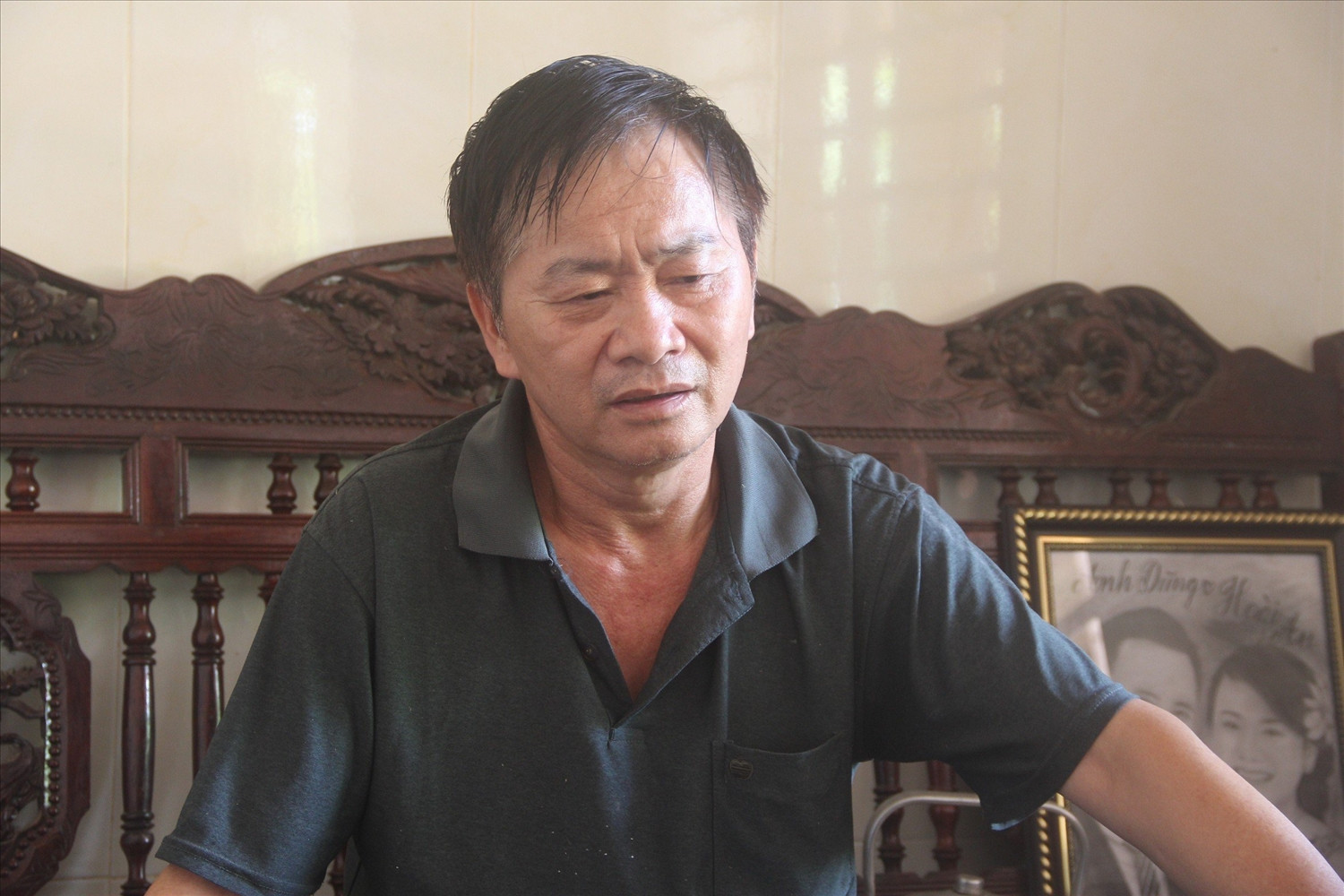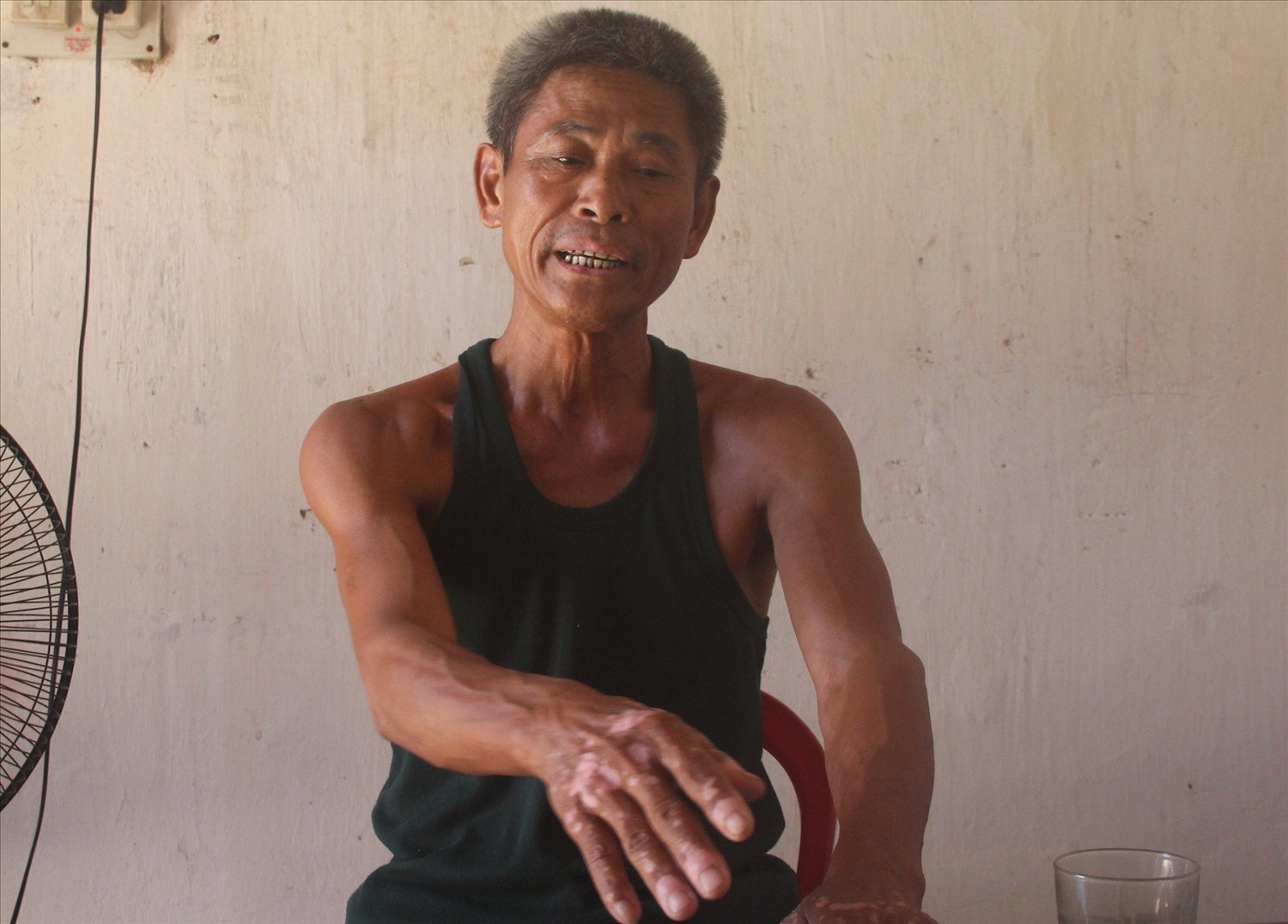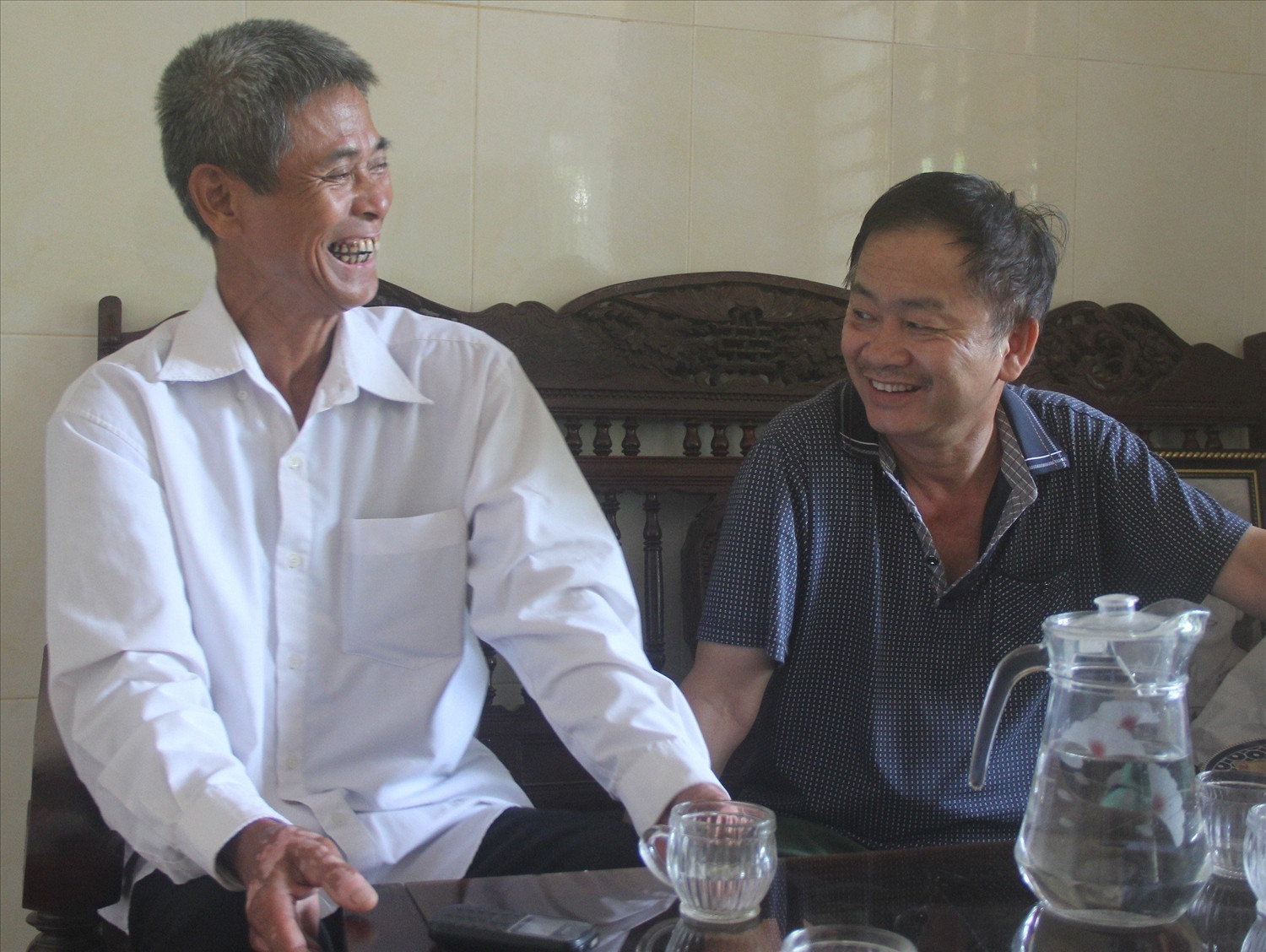The thrilling story of exoneration of a prisoner that once shocked Nghe An
(Baonghean.vn) - Sentenced to 17 years in prison for a murder case, Nguyen Sy Ly thought his life was over. A fellow prisoner who understood his injustice traveled far and wide to clear his name. That strange redress was made into a play that brought tears to many people...
Enemies on the 28th night of Tet
The heartbreaking story happened on the night of December 28, 1983, when Nguyen Sy Ly, a resident of Tam Hop commune, Quy Hop district, Nghe Tinh province (now Nghe An province), was a university lecturer in the Central Highlands, returning home for Tet. That night, Ly's family gathered around a pot of banh chung, reminiscing about the past few days of separation.
While he and his mother were scooping the cakes into a basket, his father, Mr. Nguyen Sy Huynh, took the pot to return it to the neighbor. On the way back, just as he reached the gate, the flashlight he was holding in his hand accidentally passed by the faces of two brothers, Bui Van Vinh and Bui Van Lai (from the same district), when they were returning from a trip. Without saying a word, Lai rushed forward, cursed, and kicked the flashlight out of Mr. Huynh's hand.
Hearing their father shouting outside the gate, Mr. Huynh's four children ran out. Mr. Nguyen Sy Ly conveniently grabbed the knife that was hanging on the kitchen fence... When Mr. Ly just reached the gate, Vinh and Lai were no longer there. Both of them were calm people, not wanting to fight, so Mr. Huynh's father and son went back into the house together and acted as if nothing had happened. However, when everyone thought the matter was over, a heartbreaking tragedy happened outside.

Back to the story of Vinh and Lai, when he saw Mr. Huynh's children running out, afraid of being beaten, Vinh hid in the bushes by the roadside, while Lai quickly ran forward. When everyone had left, Vinh crawled out of his hiding place and tried to catch up with his brother. In the dark, Lai did not know that it was his brother, so when he heard the sound of someone running behind him, he thought that the father and son were chasing after him to take revenge. With alcohol and a weapon to defend himself, Lai turned around and swung his knife at the person who was rushing towards him.
The cruel stab wound to Vinh’s chest caused him to collapse, and when Lai heard his brother scream “why did you stab me?” it was too late. However, in extreme fear mixed with remorse for having killed his own brother, Lai madly threw a grenade into Mr. Huynh’s house and then returned to take his brother to the emergency room, but Vinh died on the way to the clinic.
Knowing that there were no witnesses, Bui Van Lai refused to admit to killing his own brother, but instead blamed Mr. Huynh and his father. The police investigation agency got involved and very quickly, on January 7, 1983 (the 6th day of Tet), all four of Mr. Huynh and his father were temporarily detained along with their children's friend who was present the night of the explosion in front of his house to investigate the murder that left one person dead. "At that time, we were very surprised and did not understand why we were summoned," Mr. Nguyen Sy Ly recounted.
However, all the evidence seemed to be against Mr. Ly. The autopsy results showed that the victim had a 2cm long wound on his chest. When compared with the knife he was carrying that night, it coincidentally matched, because it also had a blade exactly 2cm wide. When the investigation agency met with witnesses to investigate the case, people living near Mr. Huynh's house said that night they heard Mr. Huynh calling for help and being beaten, then they heard a grenade explode. Mr. Nguyen Sy Ly explained to the investigator that the time only lasted about 1 minute. In that amount of time, he could not have run from the kitchen to the main road in front of the house in time to commit the crime. But when the investigator quoted the testimony of the neighbors, they said "very quickly, about... 5 - 6 minutes".
When searching Mr. Huynh’s house, the police also confiscated a set of bloody clothes and blood stains on the handle of a rice-leaf knife. Mr. Ly said it was the blood of a pig that he had stabbed on the afternoon of the 28th of Tet, but they believed it was the victim’s blood, so they used it as evidence to convict him. After 2 months of detention, all 4 people in Mr. Huynh’s family were still not released. Knowing that it would be difficult to clear his name in the harsh conditions of the detention center, Ly began to think of other ways.
During their time in detention, Mr. Huynh and his sons were under a lot of pressure to admit their guilt. Feeling sorry for his aging father and younger siblings, the eldest brother Nguyen Sy Ly closed his eyes and admitted that he was the one who killed Vinh so that his family could escape imprisonment.
At that time, he simply thought that he would just admit it so that his father and brother could escape the shackles, and sooner or later the real culprit would have to pay for his crimes, and he would be able to return home and go to school. But he never expected that it would take nearly 2,000 days for that injustice to be resolved.
2,000 days of injustice and a "fateful" encounter
On September 20, 1983, the People's Court of Nghe Tinh province opened the first instance trial of defendant Nguyen Sy Ly for the crime of "Murder". Ly still pleaded guilty and did not appeal. Defendant Ly was sentenced to 17 years in prison for "Murder". Immediately after the trial, defendant Nguyen Sy Ly filed an appeal to a higher court. With so many years in prison, his path to returning to his dream of standing in the lecture hall also went up in smoke.
After serving 5 years in Prison No. 3 in Tan Ky District (Nghe An), everything seemed to have ended for the young teacher, but a “God-given encounter” gave him hope. “God-given encounter” - that is how Mr. Ly often talks about his fateful encounter with his close cellmate - the person who defied all difficulties to seek justice for him.
That friend was Cao Tien Mui, from Tan Ky district (Nghe An). Mui was a convicted prisoner, but was serving his sentence at Nghi Kim Detention Camp (Vinh City), and was the "eagle" of the camp. Understanding Ly's injustice, after completing his sentence and returning to society, this person began his days of seeking justice to clear his friend's name. The journey to clear the name of his new cellmate went through countless hardships and obstacles, but in the end, the truth came true.
Nguyen Sy Ly's redress is considered the strangest in the history of Vietnamese litigation. Cao Tien Mui recalls that, on the first days of entering the prison, seeing those who called themselves "big brothers" in prison plundering supplies and exploiting fellow inmates' food, his chivalrous blood arose. Mui beat up those who called themselves "big brothers" several times. Mui's nickname "big brother black bear" was born from that. One time, because he was too strong, Mui caused 2 prisoners to be hospitalized for treatment, so he was classified as a dangerous criminal, then transferred to a room for prisoners with sentences ofkilling.
Here, Cao Tien Mui met Nguyen Sy Ly. In the following days, through intimate and open conversations, Mui began to understand Ly's injustice. And when they truly understood the tragic situation of their miserable cellmate, the two hugged each other and cried for their fate. As soon as he stepped out of prison, Cao Tien Mui embarked on a journey to find justice for his cellmate.

Mr. Mui said that day he felt sorry for the fate of a university lecturer who was in the process of writing his doctoral thesis, when suddenly disaster struck, inflicting a harsh sentence of 17 years in prison. Therefore, as soon as he left the prison, the first thing Mui did was to meet Mr. Ly's father and siblings. Meeting his friend's father, who was not yet 50 years old but had already white hair, and who had been traveling everywhere from the province to the Central to appeal for his son's innocence, a strong determination arose in his heart.
Cao Tien Mui said the key was to find Bui Van Lai and make him confess to his crime in order to resolve the issue. He traveled all the way to Nghia Xuan commune (Quy Hop) to meet Bui Van Lai's family. At first, when they learned of his wishes, the family chased him away. But then, with his perseverance, Mui gradually made them understand. Partly because through Mui, they understood the pain that the innocent Nguyen Sy Ly was suffering, and partly because Lai's conscience had begun to repent.
After a long time of seeing Mui lying around, eating and sleeping together, the family persuaded Bui Van Lai to confess. It was not easy to overturn a sentence that had been announced, because the perception at that time was very different from now. Anticipating everything, when Lai wrote a confession, Mui had 3 copies made, along with 3 other copies written by Lai himself commenting on Mui's working attitude towards Lai in the process of persuading him to confess, to avoid the situation that later when he went to the authorities, people would accuse Mui of forcing others. And it was truly "better safe than sorry", because later when leading Lai to confess, from the government to the police, the courts at all levels all believed that Mui used force to threaten and coerce Lai.
After nearly a year with Mr. Nguyen Sy Huynh, Cao Tien Mui collected all relevant documents and sent them to the Supreme People's Court, including Bui Van Lai's confession about mistakenly killing his brother. After receiving the exoneration file, Nguyen Sy Ly was temporarily released according to Decision 1265/HS of the Supreme People's Court on December 21, 1987, ending 2,000 days of injustice for a former lecturer at Tay Nguyen University.
Injustice resolved, sadness not yet subsided
In mid-August 1988, after the retrial was opened, Nguyen Sy Ly was declared innocent and released. The Procuracy came to apologize to him andcompensation for wrongful convictionsfor 2,000 days of wrongful imprisonment with an amount equivalent to 7 taels of gold at that time.
After being released from prison, he contacted Tay Nguyen University. The principal told him to continue working, but on the condition that the court had to apologize to the school for wrongly convicting its staff. “The province forced the court to agree to apologize. They made an appointment for me to go to Tay Nguyen on July 15, 1990, to apologize, but I only received an invitation a week later. I felt they were irresponsible, so I filed a complaint, but no one responded,” Mr. Ly said bitterly. His career as a lecturer ended there.
Ms. Le Thi Len, Mr. Ly's wife, recalled that at that time she was working as a farm worker in Nghia Dan. He and his wife planned to go to the Central Highlands to start a business and live, but all plans were shattered because of that unjust prison sentence. "After he was arrested and sentenced to prison, I had to walk on the street with my head down. During breaks, I had to go somewhere else to sit alone, because I was afraid that malicious people would keep whispering in my ears, saying that my husband was a university lecturer and had killed someone. Those were really terrible years," Ms. Len said.

After being released from prison, Ly and his wife built a house in Nghia Binh commune, Nghia Dan district, Len's hometown, to live. In 1990, sad and frustrated, Ly suffered a stroke, paralyzed all four limbs, and had to go to Hanoi for treatment. After more than half a year of acupuncture and exercise, he was able to move his hands and started to walk again with wooden crutches. Back home, he still lived with wooden crutches; at night, he and his wife made tofu, and in the morning, his wife took it to the market to sell. His life was miserable, struggling with wooden crutches to raise 3 children to study.
This wrongful conviction also caused his relatives to suffer. “My brother was teaching in the commune when he was transferred to a school far away. My younger brother was expelled from the Party, all because of his bad record due to a relative being imprisoned. My wife had to raise our child in humiliation. It was not until the day I was cleared that my brother was reinstated to teach in his hometown and my younger brother was allowed to participate in Party activities again,” Mr. Ly bitterly recounted. The wrongful conviction was closed. The mistakes of the prosecution agencies had been clarified.
Although this wrongful conviction ruined Mr. Ly’s reputation, he did not blame the investigators. It has been more than 30 years since Mr. Ly’s injustice was cleared up. But until now, those haunting days still haunt him in his sleep. His consolation is that if Lai had thrown a grenade that night and hit him and his father, the consequences would have been terrible.
If that year was considered a disaster for his family, it would be better for Mr. Ly to be wrongfully imprisoned than for a grenade to hit his family. The famous wrongful conviction that changed the life of this former lecturer has faded into the past. Many years later, this case was written into a play by Luu Quang Vu called “Innocent Heart”. Later, it was staged by many domestic theater troupes and renamed “Two Thousand Days of Wrongful Conviction”. The play brought tears to many audiences because it was based on a true story full of injustice, bitterness, but also full of emotion about human love.


